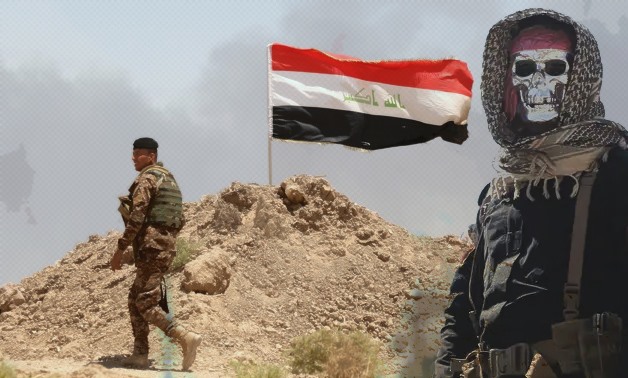
IS remnants in Baghdad have been carrying out a number of terrorist operations, suicide bombings and attacks, especially during the recent period – Photo compiled by ET staff
CAIRO – 3 March 2019: As the Islamic State (IS) is facing its final territorial defeat on the hands of the U.S.-backed Syrian Democratic Forces (SDF), the terrorist organization is probably slowly sneaking back into Iraq.
While the fall of Baghouz, an eastern Syrian village, would mark a milestone in a global campaign against IS, they remain a threat, using guerrilla tactics and holding some desolate land further west.
IS remnants in Baghdad have been carrying out a number of terrorist operations, suicide bombings and attacks, especially during the recent period.
A terrorist attack took place last week in Mosul, resulting in the martyrdom of one civilian and the injury of 24 others.
Iraqi Deputy Parliament Speaker Bashir Haddad condemned the attack, calling upon Iraqi security and military officials to revise and reconsider the security situation in Iraq, especially in Nineveh and other areas that were once liberated from IS.
Losing territory, however, does not necessarily mean the ultimate defeat of the terrorist group, according to observers and experts, who still see a possibility that the group might re-emerge in Iraq.
Earlier this month, Gen. Joseph Votel, who leads US troops in the Middle East, told CNN that ISIS will still have the ability to terrorize. The group “still has leaders, still has fighters, it still has facilitators, it still has resources,” he said.
The U.S. State Department has made similar statements. “Despite the liberation of ISIS-held territory in Iraq and Syria, ISIS remains a significant terrorist threat,” deputy spokesperson Robert Palladino said in a press release on Feb. 4.
Even Iraqi officials agree on this. As after a twin suicide bombing killed 31 people in Baghdad, former prime minister Haider al-Abadi said jihadist "sleeper cells" remain in the country and must be eliminated.
On Nov. 8, a car bomb killed at least three people in Mosul in the first such attack in the city, which had been the de facto IS capital in Iraq for nearly three years, since jihadists were ousted there in July 2017.
But with a series of political conflicts, most of which caused by interference by some countries in the Iraqi affairs, especially Iran through its sponsored Iranian Militias in Iraq and Syria (IMIS), and Iranian-affiliated politicians who have been seeking to disrupt and delay any political process or decision.
Furthermore, the organization widened its areas of operation to reach more areas during the recent weeks, including Salahuddin, Anbar, Al-Shirqat, Al-Nukhayb and Baiji, north of Baghdad.
Meanwhile, Iraqi politician Talal Al-Zobaie said in press remarks that instability and lack of security in Iraq contributed to the partial return of IS, pointing out that this is due to strong conflicts between political leaderships in the country.
In Oct. 2017, Iraqi forces captured the town of Hawija from IS, taking back one of the militant group’s last remaining strongholds.
Unfortunately, observers and analysts affirm that the IS is making a comeback in Iraq, and so far, the Iraqi government has failed to stop this re-emergence.
Reports affirm that Intelligence officials say IS was secretly preparing itself for the defeat by Iraqi forces months before by adopting guerrilla tactics when it could no longer hold territory.
As a result Iraq has now seen an increase in kidnappings and killings, mainl in the provinces of Kirkuk, Diyala, and Salahuddin, since it held an election in May, indicating the government will come under renewed pressure from the terrorists that once occupied a third of the country during a three-year reign of terror.
Comments
Leave a Comment